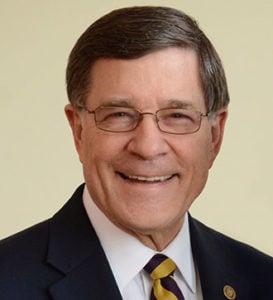Biblical Foundations of Flourishing Leadership: Exploring the 8 FLOURISH Drivers
Before coming to Best Christian Workplaces, I worked with missionaries around the world training them as leaders to spread the Gospel. When talking...

The internal, private needs of a leader today, are not about the rational, analytical and strategic “hard skills “which, even though necessary, are not sufficient to meet all the expectations for effective organizational leadership.
It’s actually the qualitative “soft skills” of behavior, practices, and attitudes that a leader must master to interact effectively and harmoniously with others.
Four decades of executive Christian experience have led Gene Habecker, my recent guest on the Flourishing Culture Podcast, and author of The Softer Side of Leadership, to name these two essential needs every leader needs to master:
 Dr. Gene Habecker
Dr. Gene Habecker
“This is that place where boundaries are placed in a way that allows refocusing of the mind and soul on a transcendent agenda, a place where we have been made aware of the extraordinary presence of God.
Jesus did this repeatedly in his own life—pulling away to be alone with His Father, to pray (Luke 6:12). If he needed to do that, how much more do I need to do that regularly?”
“Part of soft-skill leadership is a commitment to learning about myself and my blind spots. The first two elements of emotional intelligence (self-awareness and self-regulation) involve learning about yourself. Yet leaders often resist this type of learning. Yet those who commit to these kinds of self-discovery learning, actually improve as leaders, and usually end up evoking more authenticity, more honesty, and more humility in their leadership.”
Gene names six soft skills that need to be embedded in the healthy culture of an organization: creativity, accountability, the leader follower dynamic, love, trust, and forgiveness. It’s these last two, where your softer side of leadership can truly shine.
“Leaders need to reflect relational integrity in their lives. Be persons of good character in all areas of your life, not just the visible parts. What leaders say must also be lived, not just during the good times, but also during the difficult seasons, and if it’s not, trust deteriorates. The walk and the talk, within their community, must be in complete alignment.
“Relational integrity must be connected to perceived competence to do the job. Stephen Covey links character with competence. A surgeon might have great relational skills, but if they are not a very good surgeon, they won’t be trusted. So, I continue to tell leaders, 'Don’t just live on your past learning, keep on learning; it’s part of the soft skill of self-discovery learning.' You must be perceived to be competent as a leader for you to be trusted. Third, be cognizant that you have a leadership trust account. Make deposits because there will also be withdrawals. When that account is empty, the leader may be finished as a leader.”
[shareable cite="Gene Habecker"]It’s actually the qualitative ‘soft skills’ of behavior, practices, and attitudes that a leader must master to interact effectively and harmoniously with others.”[/shareable]
“Think of forgiveness as a cycle:
Leaders need to be held accountable through courageous conversations. Steve Holbrook, also a former CLA board member, told me that that one of the most important questions every leader must ask: ‘Who can say ‘no’ to you (the leader) and make it stick?’ He’s right. A leader without accountability of this type is on a slippery slope and headed for a crash.”
When the forgiveness cycle is practiced, better organizational health is the result.”
Which of these needs speak directly to you? Who, in your workplace culture, might resonate with you in this area? What positive outcome do you most desire for yourself, others, and the organization?
Dr. Gene Habecker is a Senior Fellow with the Sagamore Institute (focused on Leadership Development and Capacity Building) and President Emeritus of Taylor University. He's also an Adjunct Professor in the Ph.D. Leadership program at Capital Seminary and Graduate School as well as the former President and CEO of American Bible Society.
Buy Gene's Book: The Softer Side of Leadership: Essential Soft Skills That Transform Leaders and the People They Lead

Before coming to Best Christian Workplaces, I worked with missionaries around the world training them as leaders to spread the Gospel. When talking...

As a Christian leader, you and your leadership team are working hard to create a healthy workplace environment that brings out the best in your staff...

The Role of Trust in Any Organization: The Superpower Your Team is Missing Everybody loves the story of a superhero. The best superheroes are strong...